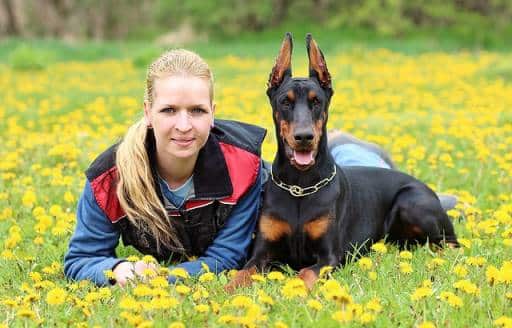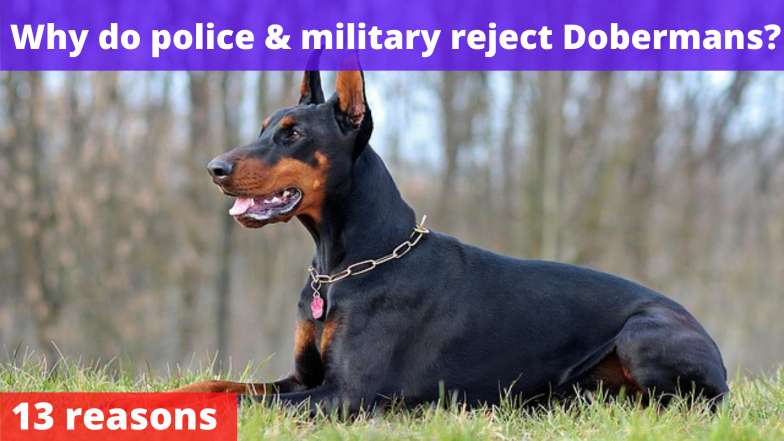I remember seeing more Dobermans working as police or military dogs when I was a kid. However, nowadays, it’s rare to see them in these roles. What happened? Let’s find out.
So, why aren’t Dobermans used as police or military dogs anymore?
There are several reasons, including their cost, time-consuming training, not being ideal for multi-handlers, bad reputation, less nerve, less trainable, less temperament, stubbornness, slow maturity, and higher potential for health issues compared to other working breeds.
In this article, we’ll explore the reasons behind this change, their military background, and some amazing facts about Dobermans. By understanding these factors, you’ll gain a better understanding of this unique breed.
Think about it for a second. While we still occasionally see K9 units with Dobermans, it’s not as common as it was a decade or two ago.
The Reasons Why Dobermans Aren’t Used Much in the Police or Military
Have you ever wondered why Dobermans aren’t used as police or military dogs anymore? It’s worth thinking about, especially if you’ve noticed that they’re not as common in these roles as they used to be.
As a Doberman owner myself, I was curious about this trend and did some research.
While Dobermans have a rich military history and are amazing creatures for this type of work, it seems that the army and police are now more inclined to use Belgian Malinois and German Shepherds for these roles.
To understand why this shift has occurred, I spoke with several dog trainers and K9 officers who have years of experience with police dogs. After careful consideration, I identified 13 (not joking!) reasons why Dobermans are no longer used as police or military dogs.

1. Expensive to Acquire and Train
Dobermans used to be heavily used by police and military forces, but they are becoming less prevalent in these roles. One reason for this is that they are more expensive to acquire than other police dogs, take longer to train, and require more time and money due to the need to dock their tails and ears.
Compared to German Shepherds or Belgian Malinois, it takes almost twice as long and costs twice as much to acquire and train a Doberman for working purposes.
2. Dobermans Don’t Do Well With Multi-Handlers
Another reason why Dobermans aren’t used as police or military dogs is that they are not ideal for multi-handlers. These dogs need to live with their handler to develop a strong bond and work effectively in the field.
If the bond between the dog and handler is weak or non-existent, it makes no sense to keep the dog in this role, and the handler may need to be changed. However, changing handlers can be challenging, as it takes time for the new person to build a bond with the dog and become a team.
In contrast, breeds like German Shepherds and Belgian Malinois are more adaptable to new handlers, making them more popular among police and military forces.
Recommended Reading: Are Belgian malinois aggressive? [Veterinarian Advice]
3. Dobermans are not suited to extreme temperatures
Dobermans struggle in extreme temperatures, which makes them less suitable for police or military work. In contrast, German Shepherds and Belgian Malinois have thick coats that insulate them from the cold and heat, making them better equipped for these roles.
To keep Dobermans comfortable, they may need to wear doggy boots and insulated jackets, which can be impractical and unsuitable for their roles as military or police dogs.
4. High potential for health problems
Dobermans are prone to health issues and injuries, which can make them less reliable in police or military work compared to other popular breeds.
5. Dobermans mature more slowly than other police or military breeds
Dobermans reach maturity around 2.5-3 years of age, which means they take longer to become ready for police or military work. In contrast, German Shepherds reach maturity around 2 years of age, and Belgian Malinois take about 2 years.
6. Bad Reputation
Dobermans have a bad reputation in the public eye, which has contributed to their decline as police or military dogs. There have been several high-profile cases of Dobermans turning on people, which has damaged their public image.
One such incident occurred in the late 70’s, when a Doberman serving as a police dog went out of control and attacked everyone around.
Overall, while Dobermans have many admirable qualities, they face several challenges that make them less suitable for police or military work compared to other breeds.
7. Tendency to bond with one person
Dobermans are more likely to bond with one person, which can make them less suitable for police or military work. After k9 training is over, the trainer hands over the dog to the handler. German Shepherds and Belgian Malinois can adapt to new owners easily, but for Dobermans, this process is more like rehoming a rescue dog, making them less popular for these roles.
8. Less suitable temperament
While there are some Dobermans that are capable of military or police work, their temperament and appearance are less ideal for these roles compared to German Shepherds and Belgian Malinois.
9. Less nerve compared to other military or police breeds
For a dog to work in police or military roles, they need to be confident and calm in adverse situations. Dobermans do not have the same level of solid and firm nerve as other breeds, such as Belgian Malinois and German Shepherds, who have an over-soldier mentality and are better at following orders.

10. The Intelligence and Cunning of Dobermans
While intelligence is an admirable trait, when combined with a little cunning, it can make Dobermans less suitable as working dogs. Dobermans tend to remember past situations and choose different approaches, which can make them less predictable and reliable compared to German Shepherds.
German Shepherds are stronger at predicting new situations, while Dobermans tend to learn from past mistakes and take different approaches. However, the primary duty of a police or military dog is to follow orders, which is why there is currently a lack of Dobermans in these roles.
Dobermans’ tendency to analyze situations before taking action can make them less suitable for police or military work, as every second counts in these roles. German Shepherds and Belgian Malinois are more likely to follow orders without hesitation, which can be an advantage in hostile situations.
In conclusion, while Dobermans have many admirable qualities, their intelligence and tendency to analyze situations can make them less suitable for police or military work compared to other breeds.
11. Less popular compared to other police or military breeds
There are fewer breeders producing Dobermans specifically for military or police work compared to German Shepherds and Belgian Malinois. This means that purebred Dobermans can be difficult to find, as there are many more certified breeders producing German Shepherds and Belgian Malinois.
12. Dobermans are less likely to bite and hold
In general, German Shepherds and Belgian Malinois are capable of biting and holding, while Dobermans tend to bite and release. While this may not be a big issue in military work, it can be a disadvantage in police work.
13. Less trainable and stubborn compared to other police or military breeds
While Dobermans are highly trainable, they are less trainable and more stubborn compared to German Shepherds and Belgian Malinois. This can make them less suitable for police or military work, where obedience and following orders are essential.
Overall, while Dobermans have many admirable qualities, they face several challenges that make them less suitable for police or military work compared to other breeds. However, this does not make them bad working dogs, but rather highlights the competition between Dobermans and other skilled working breeds.
Are Dobermans still used as police dogs or in the military?
As we discussed earlier, Dobermans were popular as military and police dogs several decades ago. However, most modern police and military forces now prefer to use other breeds for these roles.
Despite this, Dobermans can still be found in some U.S. police stations and military units. In fact, several countries continue to use Dobermans as working dogs.
What should we expect from police or military dogs?
When it comes to police or military dogs, there are certain skills and qualities that are essential. While Dobermans can adapt well to different situations, other breeds may be better suited for these roles.
Here are some of the areas where working dogs excel:
- Search and Rescue
- Apprehension
- Detection
Search and Rescue: These police and military dogs do amazing work searching for and rescuing lost victims, and have saved thousands of lives in recent decades. They have an incredible sense of smell and can track for miles to find and rescue people in need.
Apprehension: Typically, military dogs trained to apprehend suspects are extremely disciplined. In addition to apprehending and holding suspects, they are capable of fighting with them when necessary.
Detection: These dogs assist police in detecting illegal substances and materials with their excellent sense of smell.
When it comes to the personality of a K9 dog breed, it typically follows these characteristics:
- Protective
- Eager to please their handler
- Tendency to be aggressive when necessary
- Excellent at basic to advanced obedience behavior
- Intelligent and capable of learning new things quickly
- Courageous
- Possess an excellent sense of smell
What are the top breeds for police and military dogs?
Here are the top breeds that have been used as police and military dogs:
- Belgian Malinois
- German Shepherds
- Bloodhound
- Rottweiler
- Doberman
- Airedale Terrier
- Boxer
- Giant Schnauzer
- German Shorthaired Pointer (click here to see if German Shorthaired Pointers are good for first-time dog owners)
- Labrador Retriever
Conclusion
Many Doberman lovers are curious about why these dogs are no longer used as military and police dogs. In this article, we discussed 13 reasons why police and military forces tend to reject Dobermans for these roles, as well as the qualities that are essential in a working dog. We hope you found this information helpful. Have a great day!




The USMC during WW II in the Pacific put Dobies that were donated to them by owners.
They were used as dispatch runners, working point for platoons in the thick jungles of the islands, and they were also used too sniff out snipers.
They also worked to great effect as attack dogs when a position was being overran!
You can visit the Doberman memorial on Guam, and by the way this was where the Marine Corp got their moto Semper Fidelis!